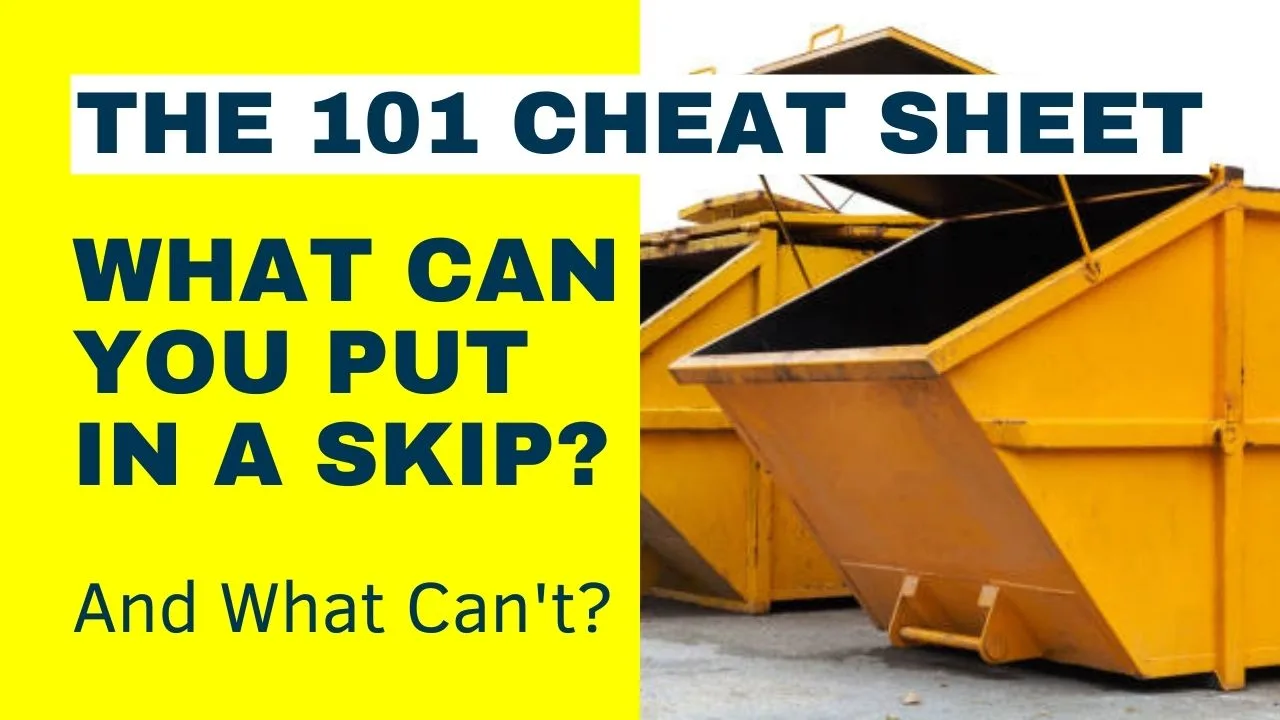What can you put in a skip? And What Can’t? 101 Cheat Sheet

Wondering about what can go in a skip?
Uncertain about acceptable items?
Don’t worry, we’ve got you covered with all the insights on “What can you put in a skip?”
A skip is a practical waste management solution widely employed in the UK. These sizeable, open-topped containers, usually made of metal, come in various sizes to cater to different waste disposal needs.
Skips are commonly used in construction, renovations, household cleanouts, and commercial tasks. Their main purpose is to provide a designated space for collecting and transporting different types of waste.
From construction materials like concrete and bricks to household items such as furniture and appliances, skips accommodate diverse materials, making them convenient for decluttering and waste removal.
With increasing environmental awareness, proper waste management has gained importance. Using skips for waste collection helps prevent illegal dumping, promoting recycling and proper disposal.
Responsible use keeps surroundings clean, safe, and contributes to resource conservation by diverting recyclables from landfills.
Note: Before we jump into what can you put in a skip? or what can’t you put in a skip? let’s remember that all Skip Hire companies/services have their own rules and regulations.
Table of Contents
What can you put in a skip? Accepted Materials That Go into Skips
If you’re curious about what can be put in a skip or what can I put in a skip?
However, following a general rule, you can put the following items in a skip. Some of the most commonly disposed of waste or items suitable for skips include:
Construction and Demolition Waste:
- Bricks and other building rubble
- Concrete
- Tiles and Ceramic
- Wood
These materials often result from renovation or building projects and can be safely disposed of in skips.
Household Waste:
- Domestic Waste
- Food Waste
- Old Furniture
- Appliances
- Garden Waste
- Old Bathroom and Kitchen Fittings
From old sofas to broken lawnmowers, skips offer a hassle-free solution for clearing out your living spaces.
Non-Hazardous Commercial Waste:
- office waste like paper, cardboard, and packaging materials.
These materials can quickly accumulate in commercial settings and benefit from organized disposal.
Note: Always ensure you’re clear on what you can put in your specific hired skip. Ask the skip hire provider if there is anything to avoid, which will ensure you aren’t fined or charged extra on collection.
What can’t you put in a skip? Understanding Prohibited Materials in Skips
While skips offer versatility in waste disposal, it’s crucial to understand materials strictly prohibited due to safety and environmental reasons. Here’s a list of items prohibited in skips:
Hazardous Waste:
- Chemicals
- Asbestos
- Solvents
- Batteries
Skips must not contain hazardous materials, as these substances can endanger both health and the environment if not disposed of correctly.
Electrical Waste (WEEE):
- TVs
- Computers
- Fridges
- Ovens
- Washing Machines
- and other electronic appliances.
Waste Electrical and Electronic Equipment, commonly known as WEEE, should not be placed in skips. These items often contain components that require specialized recycling to prevent harmful substances from entering the waste stream.
Liquids and Paints:
- Oil
- Fuel
- Paint, as well as paint cans.
During transportation, spills and leaks may happen, resulting in contamination and possible harm to the environment.
Medical Waste
- Syringes
- Needles
- and other sharp items
Clinical waste can lead to severe infections and contamination. Although it’s improbable you’ll need to dispose of any, it’s unsurprising that clinical waste isn’t permissible in skips.
Note: By understanding and adhering to these restrictions enables individuals and businesses to contribute to responsible waste disposal, diminish environmental impact, and ensure the safety of waste collection and handling processes.
Proper disposal channels, such as recycling centers and specialized collection services, are available for these restricted materials.
Environmental Considerations in Waste Disposal
Responsible waste disposal holds significant implications for the environment, emphasizing the need for careful management and recycling:
- Environmental Responsibility: Disposing of waste responsibly safeguards ecosystems and reduces pollution. Proper waste disposal prevents harmful substances from entering soil, waterways, and air, preserving natural habitats.
- Recycling Opportunities: Skips can play a role in recycling efforts by collecting materials that can be repurposed. Sorting waste before disposal enhances the potential for recycling and reduces the demand for raw materials.
- Impact of Illegal Dumping: Illegal dumping is a serious concern. Abandoned waste disrupts ecosystems, poses health risks, and mars the visual landscape. Communities suffer, and taxpayers bear the burden of cleanup costs.
- Penalties and Fines: Illegal dumping carries hefty penalties, including fines and legal action. Enforcement agencies actively monitor and pursue those responsible for improper disposal.
By making informed choices about waste disposal methods, embracing recycling, and supporting responsible waste management practices, individuals and businesses contribute to a cleaner, healthier environment.
The proper use of skips ensures that waste is disposed of in a manner that aligns with sustainability goals and regulatory standards.
Conclusion
In the world of waste management, understanding what can and cannot be placed in a skip is essential for responsible disposal. Skips offer a versatile solution for a wide range of materials, from construction waste to household items, fostering efficient cleanup and decluttering.
Remember, prohibited materials like hazardous substances, electronics, and liquids must never find their way into skips to ensure safety and environmental protection.
The importance of responsible waste disposal cannot be overstated. By using skips and adhering to guidelines, you actively contribute to preserving the environment, preventing pollution, and conserving resources. The ripple effect extends to the community, ensuring clean and safe public spaces for everyone.
As you embark on your waste disposal journey, consider the alternatives available: recycling centers, local council collections, and “man and van” services.
Tailor your choice to your specific project size, waste type, and convenience requirements. In the end, your commitment to proper waste management positively impacts the environment, community, and future generations.






